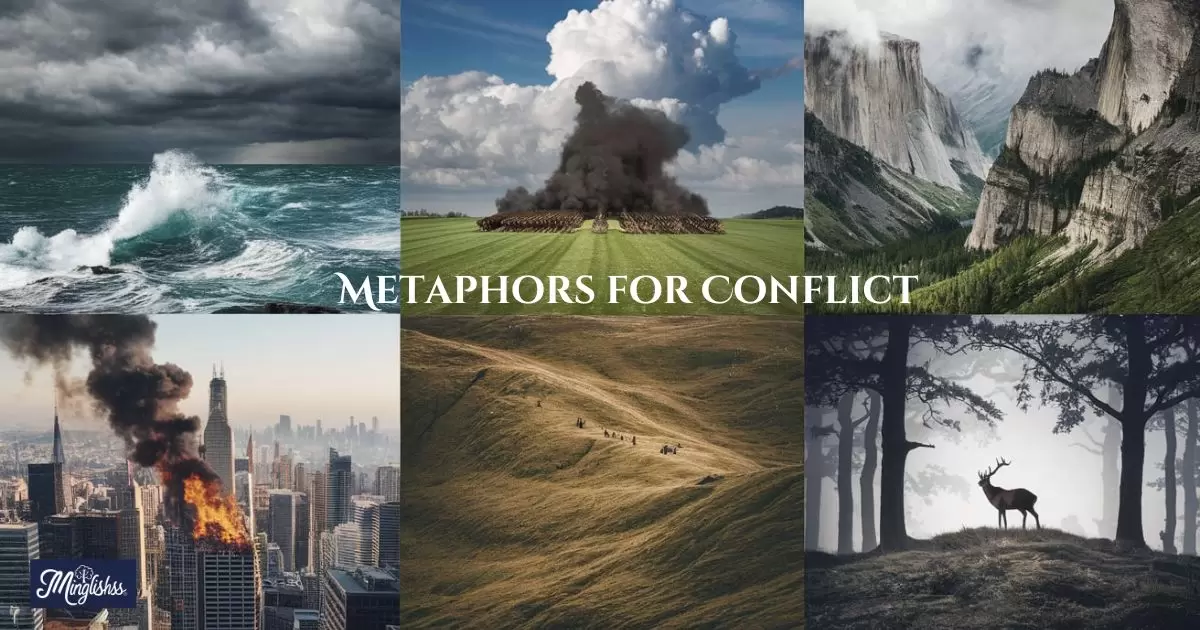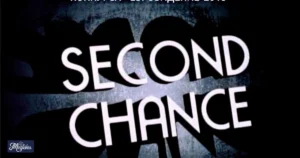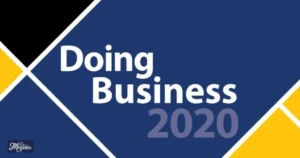Conflict is a central element in storytelling and communication, and metaphors can provide powerful ways to describe and understand it. By using metaphors, you can make the complexities of conflict more relatable and vivid.
Here are some impactful metaphors to enhance your descriptive skills when addressing conflict.
1. The Battlefield Metaphor
Meaning: Conflict is compared to a physical battle or war.
Example Sentence: “The office argument turned into a battlefield of opposing opinions.”
Example Sentence 2: “Their relationship felt like a constant battlefield, with no winner in sight.”
Explanation: This metaphor emphasizes the intensity and adversarial nature of conflict, likening it to a war where different sides struggle against each other.
2. The Storm Metaphor
Meaning: Conflict is likened to a storm, representing chaos and turbulence.
Example Sentence: “Their disagreement was a storm that shook the foundation of their friendship.”
Example Sentence 2: “Navigating their conflict was like weathering a fierce storm with no clear end.”
Explanation: This metaphor conveys the disruptive and uncontrollable aspects of conflict, suggesting it brings upheaval and turmoil.
3. The Tug-of-War Metaphor
Meaning: Conflict is compared to a tug-of-war, indicating a struggle for dominance.
Example Sentence: “Their negotiation felt like a tug-of-war, each side pulling for their own interests.”
Example Sentence 2: “In the tug-of-war of their arguments, neither side was willing to let go.”
Explanation: This metaphor illustrates the back-and-forth nature of conflict, where both sides compete for control or victory.
4. The Iceberg Metaphor
Meaning: Conflict is compared to an iceberg, suggesting that most of it is hidden beneath the surface.
Example Sentence: “What seemed like a minor disagreement was just the tip of the iceberg in their conflict.”
Example Sentence 2: “The iceberg of their issues was far larger than the visible argument.”
Explanation: This metaphor highlights that underlying issues and complexities in conflict are often not immediately visible, with only a small portion being apparent.
5. The Maze Metaphor
Meaning: Conflict is likened to a maze, representing confusion and difficulty in finding a resolution.
Example Sentence: “Resolving their conflict was like finding a way out of a complex maze.”
Example Sentence 2: “Each argument felt like another twist in the maze of their relationship troubles.”
Explanation: This metaphor illustrates the complexity and confusion often involved in resolving conflicts, where finding a solution can be challenging.
6. The Volcano Metaphor
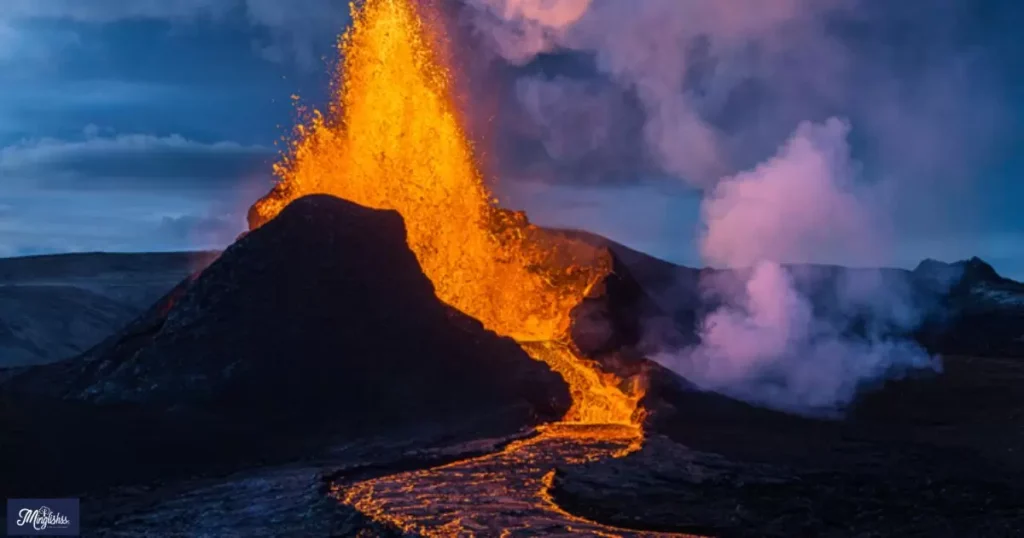
Meaning: Conflict is compared to a volcano, indicating a buildup of pressure that eventually erupts.
Example Sentence: “Their arguments were like a volcano, with tensions simmering until they finally erupted.”
Example Sentence 2: “The conflict had been brewing like a volcano, and the outburst was inevitable.”
Explanation: This metaphor conveys the idea of conflict escalating over time, eventually resulting in a dramatic or explosive confrontation.
7. The Chess Game Metaphor
Meaning: Conflict is likened to a chess game, where strategic moves and counter-moves are involved.
Example Sentence: “Negotiating with him felt like playing a high-stakes game of chess.”
Example Sentence 2: “Each argument was a move in the chess game of their complex relationship.”
Explanation: This metaphor emphasizes the strategic and calculated nature of conflict, where each side makes deliberate moves to gain an advantage.
8. The Roller Coaster Metaphor
Meaning: Conflict is compared to a roller coaster, suggesting emotional highs and lows.
Example Sentence: “Their conflict was like a roller coaster, full of intense ups and downs.”
Example Sentence 2: “The emotional ride of their arguments felt like a never-ending roller coaster.”
Explanation: This metaphor reflects the fluctuating and unpredictable nature of conflict, where emotions and situations can rapidly change.
9. The Fire Metaphor
Meaning: Conflict is likened to a fire, representing its potential to spread and consume.
Example Sentence: “Their disagreement was a small spark that quickly ignited into a raging fire.”
Example Sentence 2: “The conflict had the potential to spread like wildfire, consuming everything in its path.”
Explanation: This metaphor illustrates how conflict can escalate quickly and have widespread effects, much like a fire that starts small but can become uncontrollable.
10. The Rope Metaphor
Meaning: Conflict is compared to a rope, indicating tension and the potential for breaking points.
Example Sentence: “Their strained relationship was like a rope stretched to its breaking point.”
Example Sentence 2: “Every argument added more strain to the rope of their friendship, threatening to snap.”
Explanation: This metaphor highlights the tension and pressure in a conflict, suggesting that it can reach a point where it can no longer be sustained.
11. The Wall Metaphor
Meaning: Conflict is likened to a wall, representing barriers and obstacles.
Example Sentence: “Their communication issues were like a wall separating them from understanding each other.”
Example Sentence 2: “The wall of mistrust was high and difficult to dismantle in their conflict.”
Explanation: This metaphor illustrates how conflict can create barriers that hinder resolution and understanding, much like a physical wall obstructs movement.
12. The Jigsaw Puzzle Metaphor
Meaning: Conflict is compared to a jigsaw puzzle, indicating that it consists of many pieces that need to fit together.
Example Sentence: “Resolving their conflict was like solving a complex jigsaw puzzle, with each piece needing to fit perfectly.”
Example Sentence 2: “Understanding the full picture of their argument required putting together the jigsaw puzzle of their emotions.”
Explanation: This metaphor conveys the complexity of conflict resolution, where many different aspects need to be addressed to achieve a complete understanding.
13. The Boxing Match Metaphor
Meaning: Conflict is likened to a boxing match, representing a competitive and confrontational struggle.
Example Sentence: “Their debate was like a boxing match, with each side delivering powerful arguments.”
Example Sentence 2: “The conversation felt like a boxing match, with each participant landing verbal punches.”
Explanation: This metaphor emphasizes the combative and competitive nature of conflict, suggesting that it involves direct confrontation and competition.
14. The Volcano Metaphor
Meaning: Conflict is compared to a volcano, indicating the potential for explosive outcomes.
Example Sentence: “The simmering tension between them was like a volcano waiting to erupt.”
Example Sentence 2: “The conflict had been bubbling beneath the surface, like a volcano ready to explode.”
Explanation: This metaphor highlights the build-up and potential for a dramatic outburst in conflict, similar to a volcano’s eruption.
15. The Battlefield Metaphor
Meaning: Conflict is compared to a battlefield, emphasizing a hostile and combative environment.
Example Sentence: “Their argument was a battlefield of accusations and counterclaims.”
Example Sentence 2: “The negotiation felt like a battlefield, with each side defending their position fiercely.”
Explanation: This metaphor conveys the hostile and adversarial nature of conflict, where opposing sides clash like soldiers on a battlefield.
16. The Scissors Metaphor
Meaning: Conflict is likened to scissors, indicating the cutting and dividing nature of disputes.
Example Sentence: “Their disagreement acted like scissors, cutting their friendship into pieces.”
Example Sentence 2: “The conflict was like a pair of scissors, slicing through their communication.”
Explanation: This metaphor illustrates how conflict can divide and separate, similar to how scissors cut through materials.
17. The Tornado Metaphor
Meaning: Conflict is compared to a tornado, representing its ability to create chaos and destruction.
Example Sentence: “Their argument was a tornado, uprooting everything in its path.”
Example Sentence 2: “The conflict had the destructive force of a tornado, leaving chaos in its wake.”
Explanation: This metaphor highlights the chaotic and destructive nature of conflict, suggesting it can disrupt and damage everything in its path.
18. The Minefield Metaphor
Meaning: Conflict is likened to a minefield, indicating hidden dangers and risks.
Example Sentence: “Navigating their argument felt like walking through a minefield, with potential pitfalls at every turn.”
Example Sentence 2: “The relationship was a minefield of unresolved issues, each one ready to explode.”
Explanation: This metaphor conveys the idea that conflict can be full of hidden dangers and risks, requiring careful navigation to avoid further issues.
19. The Sieve Metaphor
Meaning: Conflict is compared to a sieve, representing the process of filtering and separating.
Example Sentence: “Their arguments were like a sieve, filtering out the truths from the misunderstandings.”
Example Sentence 2: “Resolving their conflict required letting the sieve sort through the emotions and facts.”
Explanation: This metaphor suggests that conflict involves sorting and filtering through various elements, similar to how a sieve separates different materials.
20. The Duel Metaphor
Meaning: Conflict is likened to a duel, representing a one-on-one confrontation or competition.
Example Sentence: “Their discussion felt like a duel, each side determined to outwit the other.”
Example Sentence 2: “The debate was a verbal duel, with both sides fighting for dominance.”
Explanation: This metaphor emphasizes the competitive and confrontational aspects of conflict, where each party strives to outdo the other.
The Colors of the Sky: Evocative Metaphors for Sunset
21. The Crossroads Metaphor
Meaning: Conflict is compared to a crossroads, indicating a critical decision point or turning point.
Example Sentence: “The conflict brought them to a crossroads, where they had to choose a path forward.”
Example Sentence 2: “Their disagreement was a crossroads in their relationship, requiring a decision on how to proceed.”
Explanation: This metaphor illustrates the idea that conflict presents a critical juncture where important decisions need to be made.
22. The Labyrinth Metaphor
Meaning: Conflict is likened to a labyrinth, representing complexity and difficulty in finding a way out.
Example Sentence: “Resolving their conflict was like navigating a labyrinth, with many twists and turns.”
Example Sentence 2: “Understanding their issues felt like trying to find the exit in a complex labyrinth.”
Explanation: This metaphor conveys the complexity and difficulty of resolving conflict, similar to navigating a challenging labyrinth.
23. The Volcano Eruption Metaphor
Meaning: Conflict is compared to a volcanic eruption, indicating a sudden and intense outburst.
Example Sentence: “The argument erupted like a volcano, with emotions and accusations flying everywhere.”
Example Sentence 2: “Their conflict was a volcanic eruption, spewing out all the pent-up frustrations.”
Explanation: This metaphor highlights the sudden and intense nature of conflict, akin to a volcanic eruption.
24. The Chess Match Metaphor
Meaning: Conflict is likened to a chess match, representing strategic and tactical elements.
Example Sentence: “Their negotiation was a chess match, with each side making strategic moves.”
Example Sentence 2: “The conflict resembled a chess match, where careful planning and tactics were crucial.”
Explanation: This metaphor emphasizes the strategic and calculated nature of conflict, where each party makes deliberate moves.
25. The Eruption Metaphor
Meaning: Conflict is compared to an eruption, indicating an explosive release of tension.
Example Sentence: “The disagreement was like an eruption, with feelings and frustrations spilling out uncontrollably.”
Example Sentence 2: “The conflict erupted suddenly, like a volcano spewing molten lava.”
Explanation: This metaphor conveys the idea of a sudden and forceful release of tension and emotions.
26. The Fracture Metaphor
Meaning: Conflict is likened to a fracture, representing a break or split in relationships.
Example Sentence: “Their argument caused a fracture in their friendship that was hard to heal.”
Example Sentence 2: “The conflict was a fracture in their bond, creating a visible and painful split.”
Explanation: This metaphor illustrates how conflict can cause a significant and damaging break in relationships.
27. The Tug Metaphor
Meaning: Conflict is compared to a tug, indicating a struggle to pull in different directions.
Example Sentence: “The negotiation was a tug between competing interests, with each side pulling in their direction.”
Example Sentence 2: “Their arguments felt like a constant tug, pulling their relationship in different directions.”
Explanation: This metaphor highlights the struggle and competing forces involved in conflict, similar to a tug-of-war.
28. The Roller Coaster Ride Metaphor
Meaning: Conflict is likened to a roller coaster ride, representing emotional highs and lows.
Example Sentence: “Their relationship was a roller coaster ride of intense arguments and heartfelt reconciliations.”
Example Sentence 2: “Navigating their conflict was like riding a roller coaster, with ups and downs at every turn.”
Explanation: This metaphor conveys the unpredictable and fluctuating nature of conflict, where emotions and situations vary greatly.
29. The Combustion Metaphor
Meaning: Conflict is compared to combustion, indicating a rapid and intense release of energy.
Example Sentence: “The argument was a combustion of long-held frustrations, exploding into a heated exchange.”
Example Sentence 2: “The conflict had the explosive force of combustion, igniting a firestorm of emotions.”
Explanation: This metaphor highlights the intense and sudden nature of conflict, similar to the rapid release of energy in combustion.
30. The Clash Metaphor
Meaning: Conflict is likened to a clash, representing a collision or confrontation of opposing forces.
Example Sentence: “The clash of their differing opinions created a dramatic and heated debate.”
Example Sentence 2: “Their arguments were a constant clash of viewpoints, each one challenging the other.”
Explanation: This metaphor emphasizes the confrontational and opposing nature of conflict, akin to a clash between forces.
31. The Quagmire Metaphor
Meaning: Conflict is compared to a quagmire, representing a difficult and entangling situation.
Example Sentence: “Their dispute was a quagmire of miscommunications and misunderstandings.”
Example Sentence 2: “The conflict felt like a quagmire, with no easy way out of the tangled issues.”
Explanation: This metaphor illustrates the complexity and difficulty of navigating conflict, similar to being stuck in a quagmire.
32. The Crossfire Metaphor
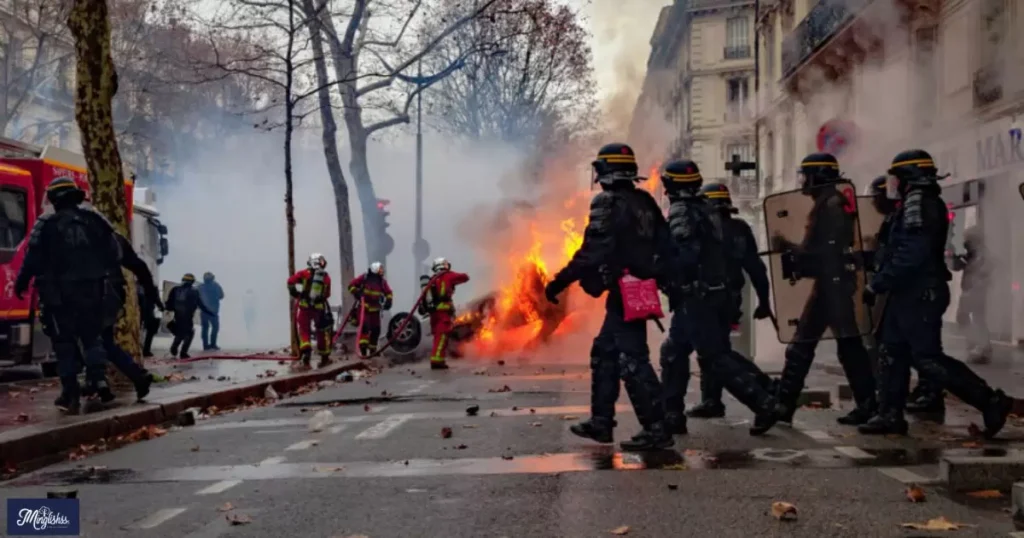
Meaning: Conflict is likened to crossfire, representing a situation where opposing forces exchange attacks.
Example Sentence: “Their conversation was caught in the crossfire of competing arguments.”
Example Sentence 2: “The debate felt like being in the crossfire, with each side firing verbal shots.”
Explanation: This metaphor conveys the intensity and adversarial nature of conflict, where both sides are actively engaging in confrontation.
33. The Avalanche Metaphor
Meaning: Conflict is compared to an avalanche, indicating a sudden and overwhelming force.
Example Sentence: “Their argument started as a small disagreement but quickly became an avalanche of accusations.”
Example Sentence 2: “The conflict had the force of an avalanche, overwhelming both parties with its intensity.”
Explanation: This metaphor highlights the sudden and overwhelming nature of conflict, similar to the destructive power of an avalanche.
34. The Riptide Metaphor
Meaning: Conflict is likened to a riptide, representing a powerful and inescapable force pulling individuals in different directions.
Example Sentence: “Their relationship issues felt like a riptide, pulling them further apart despite their efforts.”
Example Sentence 2: “Navigating their conflict was like being caught in a riptide, with no easy way to escape.”
Explanation: This metaphor emphasizes the powerful and often inescapable nature of conflict, suggesting it can pull individuals in different directions.
35. The Conflagration Metaphor
Meaning: Conflict is compared to a conflagration, representing a large and uncontrollable fire.
Example Sentence: “Their disagreement grew into a conflagration, consuming everything in its path.”
Example Sentence 2: “The conflict had the intensity of a conflagration, spreading rapidly and uncontrollably.”
Explanation: This metaphor illustrates the large and uncontrollable nature of conflict, similar to the destructive force of a conflagration.
Answer To Key Question
1. What are metaphors for conflict used for?
Metaphors for conflict help to convey complex and emotional aspects of disputes by comparing them to familiar situations or objects, making them easier to understand and relate to.
2. How can metaphors enhance storytelling?
Metaphors enhance storytelling by providing vivid and relatable imagery that helps readers or listeners grasp the nature of conflicts and their resolutions more effectively.
3. Can metaphors be used in non-fiction writing about conflict?
Yes, metaphors can be used in non-fiction writing to clarify and emphasize different aspects of conflict, making complex ideas more accessible and engaging.
4. How do I choose the right metaphor for a conflict?
Choosing the right metaphor depends on the nature of the conflict and the message you want to convey. Consider the emotions and dynamics involved to find a metaphor that best represents the situation.
5. Are there any common mistakes to avoid when using metaphors for conflict?
Avoid clichés and ensure that the metaphor is relevant and enhances understanding. Overuse or poorly chosen metaphors can confuse or distract from the main point.
6. Can metaphors for conflict be adapted for different audiences?
Yes, metaphors can be adapted to suit different audiences by considering their background, experiences, and preferences to ensure that the metaphor resonates with them.
Conclusion
Metaphors for conflict offer a creative and impactful way to describe and understand the complexities of disputes. By comparing conflict to familiar situations, such as storms, battlefields, or roller coasters, you can make its dynamics more vivid and relatable.
Embrace these metaphors to enhance your descriptive skills and bring clarity to the often turbulent world of conflict.

Hi, I’m Zadie Smith: I’m dedicated to helping others master English through practical tips. I enjoy making complex ideas simple and accessible for everyone.
